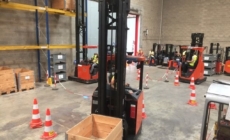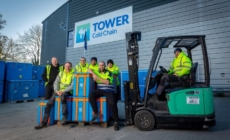-
Data-driven maintenance - October 25, 2024
-
Denby Pottery partners with ESW to overcomes post-Brexit issues and launch DTC in 29 European markets - October 24, 2024
-
BLACKOUT TECHNOLOGIES TARGETS SMARTPHONE DISTRACTION BEHIND THE WHEEL TO BOOST FLEET AND DRIVER SAFETY - October 23, 2024
-
NATUREWALL ANNOUNCES NEW PARTNERSHIP WITH ARROWXL - October 23, 2024
-
Trained fork truck operators lift safety standards and lower business costs - October 23, 2024
-
Tower Launches Customer Sustainability Hub with Practical Tools for Lower-Impact Pharmaceutical Cold Chain - October 16, 2024
-
Six decision-making models for best practice WMS digital transformation - October 16, 2024
-
“Transforming Logistics: Precision and Purpose” – BIFA takes centre stage - October 15, 2024
-
JAMES JONES & SONS LTD EXPANDS ITS PALLETS & PACKAGING DIVISION THROUGH THE ACQUISITION OF HG TIMBER LTD - October 10, 2024
-
HUGO BECK EXPANDS MACHINE RANGE FOR E-COMMERCE, MAIL ORDER AND LOGISTICS - October 10, 2024
A toxic combination of the current HGV driver shortage crisis, post-Brexit immigration rules, an unprecedented increase in demand for transport due to a change in shopping habits, and the recent ‘pingdemic’, is steering the industry towards a potential ‘Perfect Storm’ this Christmas, says Emma Verkaik, Membership & Marketing Director of the BCMPA, the Association for Contract Manufacturing, Packing, Fulfilment & Logistics.
The requirement for fulfilment services continues to grow across a wide array of sectors, including clothing, electrical, personal care, healthcare, and entertainment, and whilst BCMPA members are coping well with it, it is proving to be much more difficult to guarantee delivery on time, or sometimes even at all. As one member commented, “90% of my problems today are based not on the operational side of getting the orders and boxes out of the door, but on deliveries; we work hard to provide efficient, reliable, quick turnaround of stock, only to find it misses the delivery window due to transport challenges.”
It is estimated by the Road Haulage Association that Britain is already short of around 60,000 lorry drivers. This deficit is being further increased by the effects of the recent ‘Pingdemic’, with remaining driving staff being forced to self-isolate. In the week to 21 July alone, the number of self-isolation alerts sent by the NHS Covid-19 app in England and Wales rose by 70,000 to a new record of 689,313.
A recent demand to the government from the UK Warehousing Association for logistics staff to be exempted from the need for self-isolation if ‘pinged’ is an indication of how far reaching and disruptive the current ‘pingdemic’ is becoming.
It is clear that something needs to be done and the BCMPA is calling for the industry and government to help effect immediate change, extending the exemption from self-isolation to workers in the contract packing and fulfilment industry.
The impact of these driver shortages is already apparent and is set be felt in very real terms across the wider economy. BCMPA members fear that if a rapid, effective solution is not found, the expected further spike in demand for delivery services during retail events such as Black Friday and a post Covid Christmas could prove to be a tipping point, with empty shelves in store and patchy D2C delivery.
An undoubted further consequence of this shortage is that, in addition to the difficulties and delays experienced, costs will rise too, as large supermarket chains seek to secure their own deliveries by increasing drivers’ salaries. As an example, during July, Tesco began offering a £1,000 joining bonus for HGV lorry drivers, putting further pressure on hauliers’ costs as they attempt to retain or recruit drivers. This will inevitably lead to wage rises, costs which the industry will be unlikely to continue to be able to absorb, leading to higher on-shelf prices.
The deep-seated nature of the problem is making it difficult to see an easy – or quick – fix. Yet in many instances, a quick fix is imperative, due to the perishable, or time-dependent nature of some commodities and the enormous hole in supply.
A real sense exists amongst BCMPA members that, without fast, decisive, and wide-ranging action Christmas is in trouble, and government, industry and all interested parties need to act now to make sure it is not effectively cancelled.
































